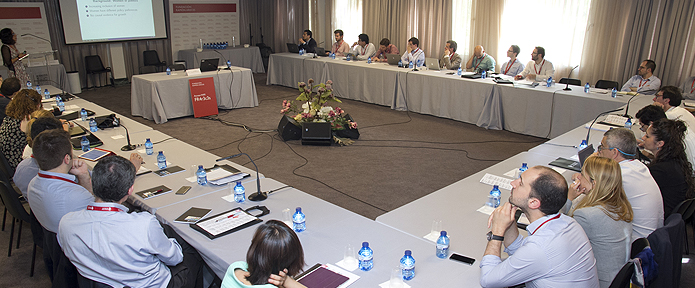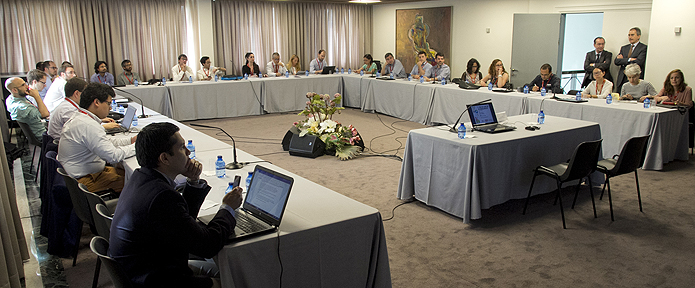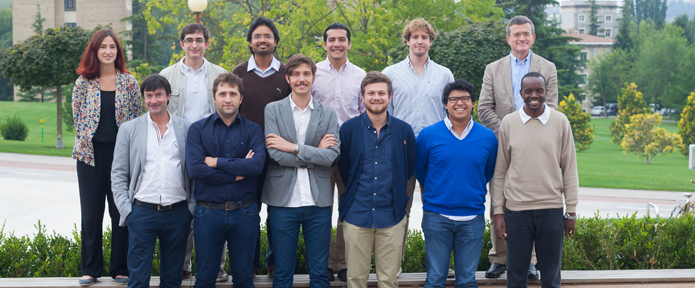"Strengthening infrastructure in a cost-effective way, supporting financial development and boosting agricultural productivity are measures core topic for sustained growth in countries at development"
Stefania Fabrizio, from the International Monetary Fund, gave a lecture discussion paper on the Sustainable Development Goals development in a meeting organized by the Navarra Center for International Development and the Ramón Areces Foundation.

Stefania Fabrizio, from the International Monetary Fund, participated in the V NCID Research Workshop, organized by the Navarra Center for International Development of the University of Navarra and the Ramón Areces Foundation on June 6 and 7 in Madrid. She gave a presentation at lecture entitled 'From ambition to implementation: policies in support of the Sustainable Development Goals development '.
Stefania Fabrizio is a Deputy Director in the Policy Division of expense in the Fiscal Affairs Division of department of the International Monetary Fund (IMF). She previously worked at department Strategy, Policy and Review, at department Europe and department Africa. His fields of research include public expense , fiscal institutions, macroeconomic risks and vulnerabilities, external competitiveness, and unemployment.
Are the Sustainable Development Goals (SDGs) attainable? development What are the priority issues?
The objectives are ambitious; they have the vision that development needs to be economically, socially and environmentally sustainable. Achieving these objectives requires action on a wide range of issues at both the national and international levels.
At the country level, governments should strive to create a healthy macroeconomic environment and undertake measures for strong and sustainable growth. Efforts should focus on building strong institutions to foster investor confidence; strengthening public finances; ensuring an efficient and well-defined public expense ; investing in infrastructure; maintaining debt sustainability; developing financial markets and fostering access to them while safeguarding financial stability; and promote inclusion and environmental sustainability. Governments also need to identify their goals core topic of development and sustainable ways to finance their achievement.
In an increasingly interconnected world there are high risks of spillover effects, so the efforts of the national development also need to be supported by building macroeconomic resilience, with adequate fiscal buffers and foreign exchange reserves to cope with external shocks.
Globally, a conducive external framework with economic and financial stability, and stable trade and financial flows, is also crucial for countries' development efforts to flourish. International cooperation is required to achieve consistency in macroeconomic policies across countries; to ensure that financial regulations in major financial centers are appropriately shaped, mutually consistent and rigorously implemented; and to build a strong network of global financial security that provides confidence that unanticipated liquidity needs can be met.
In recent years, the issue of "financial inclusion" (microcredits, microfinance...) has been in vogue. How can this approach be integrated into the Objectives of development?
Financial inclusion promotes development and can help address income and gender inequality. Empirical evidence suggests that financial sectors that are more developed and provide broader access to financial services to firms, households and women are more conducive to economic growth. Financial access, however, is only one step provisional, insofar as achieving the full benefits of financial inclusion depends on households and businesses making good use of a range of affordable and effective financial services, which goes hand in hand with financial Education and consumer protection. In addition, broader financial access can pose risks to financial and macroeconomic stability, underscoring the importance of a gradual and well-regulated process to minimize risks.
How can the International Monetary Fund integrate a "holistic view of growth" into its research?
The International Monetary Fund is uniquely positioned to support countries in pursuing the Sustainable Development Goals development . With its critical perspective on macroeconomics and global membership, the IMF can work directly with its member countries and contribute to ensuring a global environment that supports and enables sustainable development . Recognizing the need for a holistic view of growth, the Fund team has recently developed policy-oriented research on numerous development issues, including:
-
The role of diversification and structural transformation in contributing to sustained growth in countries at development -and the policies needed to support this change-. Among the measures core topic are: policies to strengthen infrastructure in a cost-effective manner; support development financial; and boost agricultural productivity.
-
Increase economic, gender and financial inclusion - through tax measures and expense that foster the redistributive role of fiscal policies while minimizing their effects on incentives to work and save, measures to increase access to financial services while preserving financial stability, and reforms to promote economic participation.
-
promote environmental sustainability by reforming energy and water pricing and building resilience to climate-related events.
Climate and environmental change has a strong presence in the Objectives of development (especially after Rio+20). How can the research on Economics of development contribute to the objectives related to this issue?
Reforming energy prices and building resilience to weather events could significantly help environmental sustainability. Eliminating energy subsidies and pricing energy through carbon taxes can also provide substantial revenues that can be used to reduce other, more distorted taxes. Through these incentive effects, carbon pricing can also help mobilize private finance toward mitigation activities and stimulate the innovation needed to address climate challenges.
The process of climate change is on track to have an economic impact on many countries, putting at particular risk a large issue of income countries leave and small island states. Macroeconomic policies in these countries will need to be calibrated to accommodate more frequent weather impacts, including building policy space to respond to such impacts, and improving the quality of infrastructure will be required to promote enhance economic resilience.





